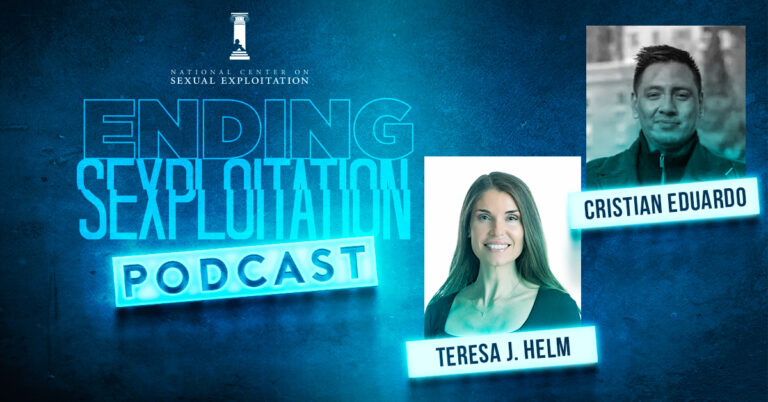The National Center on Sexual Exploitation does not endorse or support the Human Trafficking Prevention Act (HTPA) also called the Children’s Online Filtering Act.
It is not that the ideas in the proposed legislation are without merit, but the bill does not appear to be drafted with careful precision.
For example, Section 5, titled, “Duty to Hide Websites That Are Substantially Facilitating Human Trafficking Behind The Filter,” requires that any business or individual that manufactures, distributes or sells a product that has access to the internet “shall render websites that are known to be facilitating the trafficking of persons inaccessible.” “Known” to whom – to the manufacturer and the individual selling the device, or known by some generally accepted anti-trafficking or government agency (and what if there are two such agencies but they don’t agree)? Since there is no list in existence and no software database of all websites “facilitating” trafficking, a manufacturer or individual seller would be in peril merely for manufacturing or selling. Also, what is meant by “facilitating?” NCOSE has charged that Amnesty International is “facilitating” trafficking of persons because of its pro-prostitution position. Must a manufacturer or seller make Amnesty’s website inaccessible? If so, that raises serious First Amendment concerns.
It seems to us that the bill also is at odds with Supreme Court precedents. NCOSE President Emeritus, attorney Robert Peters, has reviewed a version of the bill (one prepared for the Arizona legislature) and has written the critique here raising legal concerns.
We also have two other matters that keep us from supporting the HTPA. In its current iteration under consideration in some states, the HTPA includes a resolution declaring that pornography is a public health crisis. It is a version of the resolution that the National Center on Sexual Exploitation originally drafted for the state of Utah. It is our judgment that the resolution should be considered independently from the HTPA and not added to the bill. That will prevent the resolution language from being tainted by any potential negative court scrutiny should the HTPA be passed by a state legislature. Here is the version of the resolution that we believe is a proper one for states to use.
The second matter relates to the author of the HTPA. The bill (sans resolution language) was developed by Chris Sevier, also known as Chris Severe. We have had a difficult relationship with Mr. Sevier over the last several years, to say the least. We cannot rely on his assertions that those groups and those legislators that he claims are supporters of HTPA are actually in support. That is because, in the past, Sevier has falsely represented that our organization and NCOSE President Patrick Trueman and NCOSE Executive Director Dawn Hawkins are in support of his work. We have demanded that Sevier stop using our names.
In 2015, the office of a United States Senator alerted us to the fact that Sevier was promoting a version of the HTPA at the U. S. Capitol and was representing to U. S. Senate offices that Patrick Trueman was an author of the bill. This was false. A key legal assistant with that senator’s office also said that Sevier was visiting other senate offices claiming that his boss, the senator, was supporting the legislation, which was also false.
Several organizations have contacted us over the past couple years to complain that Sevier was also using their names without authorization and some of those organizations have complained that he was threatening them with legal sanctions when they refused to support him and his work.
In 2014, our general counsel had to write a cease and desist letter to Sevier demanding that he cease threatening our organization on various matters and reminding him that as a lawyer he is bound be definitive rules of professional responsibility.
In 2016 Sevier sued the state of Utah following the passage of the above-mentioned resolution developed by our office which declares pornography to be a public health crisis. The lawsuit was ostensibly over the issue of filters (a copy of the complaint is here). It included an extended footnote, part of which we are including here, which attacks NCOSE’s President Patrick Trueman and Executive Director Dawn Hawkins in bizarre terms:
EXCERPT:
“PAT TRUMAN AND DAWN HAWKINS AT THE NCOSE ARE SEETHING FRAUDS WHO ENGAGE IN MISDIRECTIONS TO INCREASE DONATIONS BY FLOATINGSHAME SOLUTIONS TO PORNOGRAPHY AND HUMAN TRAFFICKING AT THE EXPENSE OF CONSTITUTIONAL ONES DUE TO AN EGOISM THAT MAKES THEIR ORGANIZATION A THREAT TO THE PUBLIC’S HEALTH: The sham victor of hollowness under SCR 9 is an understatement. The National Center Of Sexual Exploitation (sic) is fannying about the Country merely seeking donations to bankroll the lavish lifestyles of Pat Truman and Dawn Hawkins, who live in Washington DC, not Utah. Both Pat Truman and Dawn Hawkins are the poster children of absolute incompetency when it comes to fighting pornography and sex trafficking in a meaningful and valid way . . . ..
Citizen groups and legislators are free to make their own decisions on whether to work with Mr. Sevier. There are many postings that are easy to find with just a Google search of “Chris Sevier.”
We hope that this posting clarifies our legal and personal positions regarding the bill and its author so that the many who have asked why we are not supporting the HTPA will understand.
NCOSE’S LEGAL ANALYSIS OF THE HUMAN TRAFFICKING PREVENTION ACT (HTPA)
(Arizona 2017 Version)



